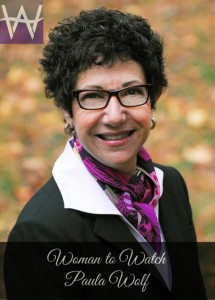Back in 1993, when Paula Wolf first began her career as a lobbyist to the North Carolina General Assembly, she was walking with her then mentor and boss, and they saw a young professional woman wearing a hat. Her boss turned to her and said, only half joking, “If you ever wear a hat, you’re fired.”
A flippant remark, with a powerful underlying message: women better watch their step. Back then, women lobbyists and legislators were few on the ground, and the rule of the old boys’ club was paramount. The unwritten codes—of behavior, of dress—could make or break a career, and to be taken seriously as a lobbyist, Wolf had to learn those rules quickly.
Even when she did learn them, there was still the issue of access. Those who had it and those who didn’t. Wolf didn’t. Expensive dinners at Sullivan’s Steakhouse, deals made inside smoke-filled rooms, these levels of legislator access were reserved for lobbyists who were “friends,” in particular, friends with expense accounts. Wolf and many of her fellow female lobbyists were left out in the cold.
“I was making appointments to see [the legislators] in their offices,” Wold said. “It was all very formal.”
Despite starting as an outsider, Wolf thrived as a lobbyist in North Carolina. She topped the lists of most influential lobbyists in North Carolina with regular frequency, especially when she worked as the Chief Lobbyist for the >>Covenant with North Carolina’s Children. As a contract lobbyist, Wolf represented organizations ranging from the March of Dimes Foundation, Health Care for All NC, and Friends of Residents in Long Term Care.
Twenty years into her career, however, Wolf decided to take a step back from the General Assembly. She witnessed so many programs she had helped build get dismantled, cut, destroyed, and eliminated.
“It just felt … it was soul crushing. I couldn’t stand it anymore. I couldn’t be there anymore.”
But it is this very moment in the North Carolina General Assembly, this moment where veto-proof majorities have stymied the efforts of some women’s advocacy groups, that offers inspiration for Wolf.
“I am so proud and pleased about the thriving progressive community,” Wolf beams. She points to the creation of >>NC Women United as a shining example of how advocacy groups came together to ensure their issues are given a voice.
Wolf also is impressed by the “tremendous work” being done by >>Reverend William Barber and so many activist groups for the nationally recognized >>Moral Monday protests at the North Carolina General Assembly. It is this type of participation — non-politicians speaking out — that ultimately makes the differences in a democratic government, according to Wolf.
“Legislation will happen to you even if it doesn’t happen for you,” Wolf warned. “Many people don’t realize how much power the legislature has over their lives in so many ways. People say, ‘oh, I’m not political,’ or, ‘I can’t stand politics.’ Well, everything is political.”
And according to Wolf, this is what women need to understand about politics and government. “The democratic process works, but it requires that everybody participate.” Women must participate in order to have their voices heard.
So, what can women do to ensure their issues are given a voice?
Wolf says, start by getting educated and by getting involved in small ways. Read the paper. Call your representative. >>Join an AdvaNCe Team. Check out information from the >>North Carolina Justice Center.
“You don’t have to reinvent the wheel,” Wolf says. “There are ways to get involved and there are really smart people who are writing about the issues and keeping people informed.”
>> Melissa Geil is a freelance writer and English teacher. Although originally from New York, she moved to North Carolina the first time for college, and now she is back to stay. She enjoys reading, hiking, and gallivanting around the triangle with her family.
Melissa Geil is a freelance writer and English teacher. Although originally from New York, she moved to North Carolina the first time for college, and now she is back to stay. She enjoys reading, hiking, and gallivanting around the triangle with her family.

Very nice article about a woman of substance and intelligence!
Good to see people in North Carolina care about their people.